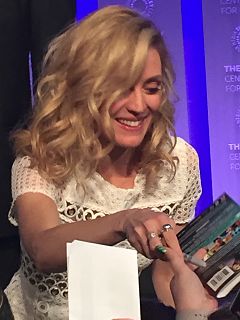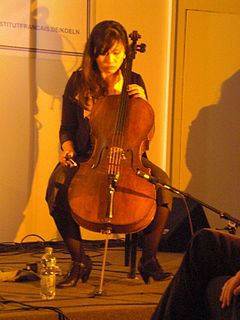A Quote by Gaby Hoffmann
I know that the emotional narrative will work in the end, and I just have to play each moment honestly even if the getting from A to B doesn't totally make sense initially.
Related Quotes
I think my sensibilities about storytelling and character just automatically come into play when I'm trying to work on any kind of narrative. For me, it doesn't really matter what the source of the narrative is. I will be looking for ways to make it into an intriguing story with empathetic characters.
Work, as we usually think of it, is energy expended for a further end in view; play is energy expended for its own sake, as with children's play, or as manifestation of the end or goal of work, as in "playing" chess or the piano. Play in this sense, then, is the fulfillment of work, the exhibition of what the work has been done for.
For me, it’s like playing the same instrument but in a different context. TV work – it’s really about getting it just right. You have a chance to try again if it’s not. Theatre is like playing a rock show. It doesn’t really matter if you make a tiny mistake. It’s the whole vibe and getting people to feel you. It’s about carrying the moment through all the way with you in an hour and 20 minutes of the narrative.
In the Christian sense, love is not primarily an emotion but an act of the will. When Jesus tells us to love our neighbors, he is not telling us to love them in the sense of responding to them with a cozy emotional feeling. You can as well produce a cozy emotional feeling as you can a cough or sneeze. On the contrary, he is telling us to love our neighbors in the sense of being willing to work for their well-being even if it means sacrificing our well-being to that end.
Well, I'd say that I'm mostly drawn to people who are genuine and willing to take a step to the unknown. So when I play with these people, usually there's this sense of that 'yes, we are doing it together right at this moment without any agenda' feeling which is so exciting! It means that there is this sense of trust, that whatever I throw in the music that's happening, they will make it work and send something to work with in my direction. Hopefully they feel the same about me.
You know that this vignette and that vignette belong side by side, you know that a certain turn of phrase you've been saving will probably work best within a given section of the narrative. As in a jazz performance, writing lives or dies by what's produced in that moment. But that moment is attended by long preparation.
Once you play with these scenes and you're outlining it, again and again, and telling each other the narrative, and telling it to people you know, trying to make sure that the mathematics of the story work, you feel that those are in place, and the actual writing and final draft doesn't take as long.
Starting in middle school, I would play on two or three baseball teams at the same time, because that's just how things worked in south Florida. I would practice six or seven days each week. I honestly don't know how my parents did it, but my dad always found a way to make it to each and every game.




































